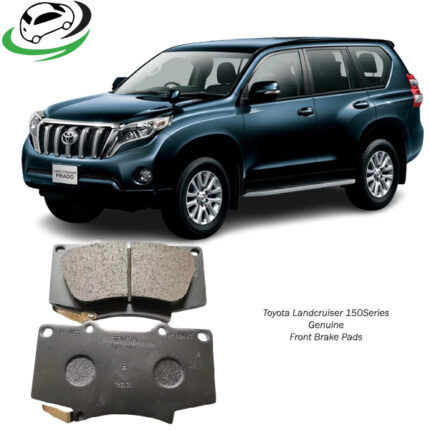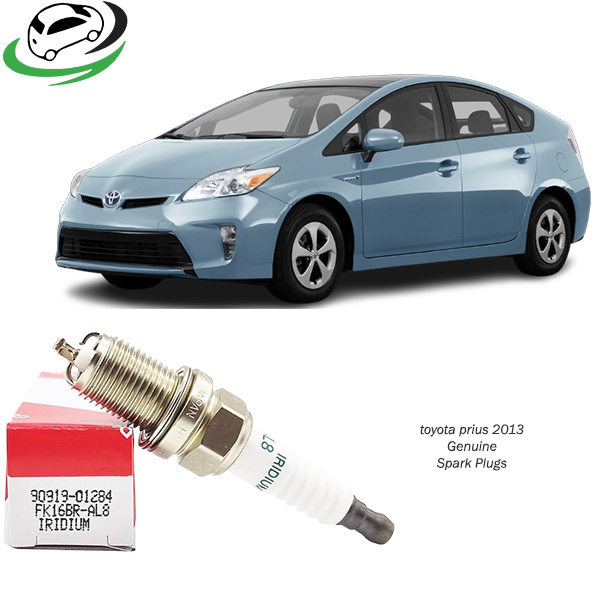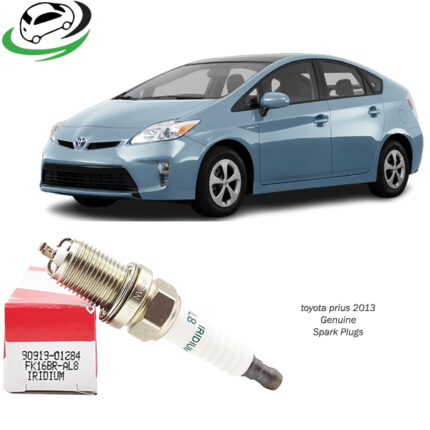Get Toyota Prius 2013 Genuine Spark Plugs 9091901284 in Kenya
Spark plugs are an essential component of any gasoline-powered engine, providing the necessary spark that ignites the air-fuel mixture in the combustion chamber. This small, yet critical part is the driving force behind the engine’s power, efficiency, and smooth operation. Genuine spark plugs, specifically those made by Original Equipment Manufacturers (OEMs), are designed to meet or exceed the specifications of your vehicle’s engine, ensuring optimal performance and longevity.
In this guide, we’ll explore the function of spark plugs, the different types available, their materials, benefits of using genuine spark plugs, signs of wear, and maintenance tips.
1. Function of Spark Plugs
The spark plug is responsible for igniting the air-fuel mixture within the engine’s cylinders. In a four-stroke engine cycle, the air and fuel are mixed and compressed in the cylinder before the spark plug creates an electrical spark at just the right moment. This spark ignites the compressed mixture, causing an explosion that forces the piston down and powers the engine.
The key functions of a spark plug include:
a. Ignition of the Air-Fuel Mixture:
The primary purpose of the spark plug is to generate the spark that ignites the air-fuel mixture. The spark needs to be strong enough to ignite the mixture even under high-pressure conditions, making the quality of the spark plug crucial.
b. Heat Dissipation:
Spark plugs also play a role in dissipating the heat generated in the combustion chamber. This helps prevent engine knocking and detonation, protecting the engine from overheating and damage.
c. Conducting Electrical Energy:
The spark plug conducts high-voltage electricity from the ignition coil to the combustion chamber, allowing the spark to ignite the fuel. The plug needs to be a reliable conductor to ensure proper engine performance.
2. Types of Spark Plugs
There are several different types of spark plugs available, each designed for specific engine requirements and operating conditions. The most common types include:
a. Copper Spark Plugs:
Copper spark plugs have a copper core and a nickel-alloy electrode. These plugs offer excellent conductivity, but the nickel-alloy electrode is softer and tends to wear out more quickly than other materials. Copper spark plugs are typically used in older vehicles or high-performance engines that require a hotter spark. However, they may not last as long as other types of plugs.
b. Platinum Spark Plugs:
Platinum spark plugs feature a platinum disc welded to the tip of the center electrode. Platinum is harder and more durable than nickel alloy, making these plugs longer-lasting and more resistant to wear. They also generate a more consistent spark, improving fuel efficiency and performance. Platinum spark plugs are common in modern vehicles and can last up to 100,000 miles.
c. Double Platinum Spark Plugs:
Double platinum spark plugs have platinum on both the center and ground electrodes, offering even greater durability and longevity than single platinum plugs. These are often used in vehicles with a “waste spark” ignition system, which fires the spark plug twice per cycle. The double-platinum construction ensures consistent performance and longer life.
d. Iridium Spark Plugs:
Iridium spark plugs feature an iridium tip on the center electrode. Iridium is one of the hardest metals used in spark plugs, offering superior durability, better heat resistance, and a more reliable spark. These plugs are typically more expensive than other types but are known for their exceptional performance and long life, often lasting up to 120,000 miles. Iridium plugs are commonly found in high-performance and luxury vehicles.
3. Materials Used in Spark Plugs
The materials used in spark plugs play a crucial role in determining their performance, durability, and heat dissipation. The three primary materials used in genuine spark plugs are:
a. Copper:
Copper provides excellent electrical conductivity, making it ideal for spark plugs in high-performance applications. However, copper is soft and wears down quickly, requiring more frequent replacement.
b. Platinum:
Platinum is harder and more heat-resistant than copper, offering improved durability and longevity. Platinum plugs are a great choice for most modern vehicles that do not require the extreme heat resistance of iridium.
c. Iridium:
Iridium is a very hard and heat-resistant material, making it ideal for high-performance or long-life spark plugs. Iridium plugs offer superior ignition performance, better fuel efficiency, and can last much longer than copper or platinum plugs.
4. Benefits of Using Genuine Spark Plugs
Genuine spark plugs offer several advantages over aftermarket or counterfeit parts. Here are the key benefits:
a. Optimized Engine Performance:
Genuine spark plugs are specifically designed to match the engine’s specifications, ensuring optimal performance. They provide a more reliable and consistent spark, leading to smoother engine operation, improved acceleration, and better fuel efficiency.
b. Durability and Longevity:
OEM spark plugs are made from high-quality materials like platinum or iridium, offering greater durability and a longer lifespan. Genuine plugs are less likely to wear out prematurely, reducing the frequency of replacement and maintenance costs over time.
c. Improved Fuel Efficiency:
By delivering a consistent and reliable spark, genuine spark plugs help to optimize the combustion process. This leads to better fuel efficiency, as more of the fuel is effectively burned in the combustion chamber. Over time, this can result in noticeable savings on fuel costs.
d. Reduced Emissions:
Properly functioning spark plugs ensure that the air-fuel mixture is burned efficiently, which helps reduce harmful emissions. Genuine spark plugs are designed to meet the strict emissions standards of modern vehicles, contributing to a cleaner and more environmentally friendly engine.
e. Minimized Risk of Engine Damage:
Using counterfeit or low-quality spark plugs can result in misfires, engine knocking, and even damage to the engine’s cylinders or pistons. Genuine spark plugs reduce the risk of these issues by providing a reliable and precise spark.
f. Warranty and Manufacturer Approval:
Genuine spark plugs come with the manufacturer’s warranty and approval, providing peace of mind that they are the right fit for your vehicle. They are designed to meet the specific requirements of your engine, ensuring compatibility and performance.
5. Signs of Worn Spark Plugs
Over time, spark plugs can wear out or become fouled, leading to poor engine performance. Here are some common signs that your spark plugs may need to be replaced:
a. Engine Misfires:
One of the most common symptoms of a worn or failing spark plug is engine misfiring. If the spark plug fails to ignite the air-fuel mixture properly, it can result in a misfire, causing rough idling, poor acceleration, and a noticeable drop in power.
b. Poor Fuel Economy:
Worn spark plugs can cause incomplete combustion, leading to increased fuel consumption. If you notice a sudden drop in fuel efficiency, it may be a sign that your spark plugs need to be replaced.
c. Difficulty Starting the Engine:
If your engine is slow to start or requires multiple attempts to turn over, it could be due to worn spark plugs. A weak spark can make it difficult for the engine to start, especially in cold weather.
d. Rough Idling:
A rough or shaky idle can indicate that one or more spark plugs are not firing correctly. This can lead to uneven engine operation and vibrations at idle.
e. Engine Knocking or Pinging:
When spark plugs are worn or fouled, they may cause the air-fuel mixture to ignite at the wrong time, leading to engine knocking or pinging. This can cause damage to the engine over time if not addressed.
f. Check Engine Light:
In many modern vehicles, the onboard diagnostic system will detect issues with the spark plugs and trigger the check engine light. If the check engine light comes on, it’s important to have the vehicle inspected to determine if the spark plugs need to be replaced.
6. Maintenance Tips for Spark Plugs
Proper maintenance of your spark plugs is essential for ensuring optimal engine performance and longevity. Here are some tips for maintaining your spark plugs:
a. Follow Manufacturer’s Recommendations:
Always follow the manufacturer’s recommended interval for spark plug replacement. This is typically between 30,000 and 120,000 miles, depending on the type of spark plug and the vehicle.
b. Inspect Spark Plugs During Routine Maintenance:
During routine maintenance, such as oil changes or engine tune-ups, inspect the spark plugs for signs of wear or fouling. Look for corrosion, carbon buildup, or worn electrodes.
c. Use the Correct Type of Spark Plug:
Always use the type of spark plug recommended by the vehicle manufacturer. Using the wrong type of plug can lead to poor performance, engine misfires, or even damage to the engine.
d. Check the Spark Plug Gap:
Ensure that the spark plug gap is set correctly according to the manufacturer’s specifications. An incorrect gap can cause misfires, poor fuel economy, and engine performance issues.
e. Replace Spark Plug Wires (If Applicable):
In vehicles with spark plug wires, it’s a good idea to replace the wires along with the spark plugs. Worn or damaged spark plug wires can reduce the effectiveness of the spark and lead to misfires.
Conclusion
Genuine spark plugs are a critical component of your vehicle’s ignition system, ensuring reliable performance, fuel efficiency, and engine longevity. By using high-quality, OEM-approved spark plugs, you can maximize the performance of your engine while reducing emissions and minimizing the risk of damage. Regular inspection and maintenance of spark plugs are essential for keeping your vehicle running smoothly, ensuring that it continues to perform at its best for years to come.
Follow us on Facebook for more parts.





Reviews
Clear filtersThere are no reviews yet.